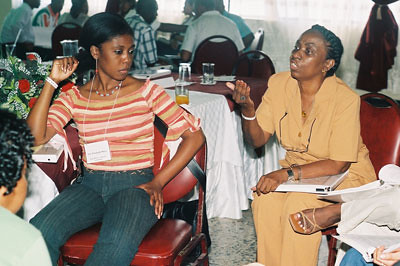
Afro-Colombians discuss the main problems they face during a working group session at the Cartagena training on the use of the Inter-American Human Rights System. February, 2004., a photo by Pan-African News Wire File Photos on Flickr.
Havana
December 1, 2011
Report highlights exclusion and discrimination faced by Black youth in Latin America
Karol Assunção
"AFRO-DESCENDANT youth constitute one of the groups most affected by the structural societal features of exclusion, inequality and poverty." This is the conclusion drawn by the report Afro-descendant Youth in Latin America: diverse realities and rights (un)acknowledged, released November 18 during the International Year for People of African Descent Ibero-American Summit, Afro XXI, in Salvador de Bahía, Brazil.
The document, prepared by the UN Population Fund (UNFPA) and ECLAC, the Economic Commission for Latin America and the Caribbean, presents a regional overview of afro-descendant youth, highlighting their demographic and socioeconomic reality and the importance of promoting their inclusion in society as a whole.
Based on information from Afro-descendants' organizations, the report indicates that these youth face "triple exclusion:" ethnic, being of African descent; class, being poor; and generational, given their age. Young Afro-descendent women additionally face exclusion based on gender. "Afro-descendant youth find themselves the focus of several tensions, and therefore, have many demands which, to summarize, include the following. They demand of the rest of society greater inclusion, full access to development and the exercise of their rights. Of adults they demand more opportunities to participate and make decisions," the report states.
According to the study, Brazil, Colombia, Costa Rica, Ecuador, El Salvador, Guatemala, Honduras, Nicaragua and Panama together have more than 24 million Afro-descendant youth between the ages of 15 and 29. Of this total, Brazil has the greatest number, 22 million.
The report indicates that the majority of these youth are urban. A lack of access to goods and public services, violence, discrimination at work and an elevated mortality rate as a result of external factors are among the principal problems facing these youth. The study notes that, in Brazil, for example, an Afro-descendant youth between the ages of 15 and 17, is 125.8% more likely to be murdered than a white youth.
Also emphasized are sexual and reproductive issues facing Afro-descendant youth, "In the majority of countries, a greater incidence of pregnancy is observed among young Afro-descendant women, 15 to 19 years of age, as compared to peers within this age group. Also noted is the correlation between education and teenage pregnancy. Among the most educated Afro-descendants, with standard educational careers, pregnancy is significantly lower, as compared to young women with less education and limited experience in school," the report continues.
The document also calls attention to inequality of opportunity in education and employment. According to the report, in six of the nine countries studied, the percentage of Afro-descendant youth who are not working or studying is greater than their peers.
"In this regional area, where Afro-descendant youth systematically suffer exclusion and discrimination, it is imperative that both practices be eradicated, given the flagrant violation of human rights they represent. From a purely economic point of view, several studies have demonstrated the high cost of discrimination, indicating that its elimination would constitute a significant investment in society as a whole," the report concludes.
(Taken from de Adital)
No comments:
Post a Comment